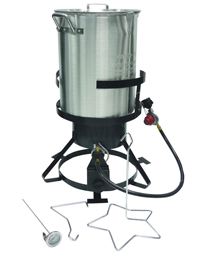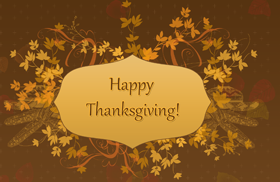Thanksgiving is one of the most enjoyable times of the year, but it is also one of the busiest for fire departments. The hot ovens and stovetops can create a dangerous environment if extra precautions aren’t taken. In addition, fried turkey tastes great, but the process can be dangerous. The National Fire Prevention Association offers the tips below:
- Stay in the kitchen while cooking on the stovetop.
- Stay in the home when cooking your turkey. Check on it frequently.
- Keep children three feet away from the stove.
- Make sure kids stay away from hot food and liquids. The steam or splash from hot beverages or food being cooked could cause serious burns.
- Keep the floor clear of tripping hazards.
- Keep knives out of the reach of children.
- Be sure electric cords are not dangling off the counter within reach of a child.
- Keep matches and lighters out of the reach of children — in a high, locked cabinet.
- Never leave children alone in a room with a lit candle.
- Make sure smoke alarms are working. Test them by pushing the test button.
NFPA discourages the use of outdoor gas-fueled turkey fryers that immerse the turkey in hot oil.
These fryers use a substantial quantity of cooking oil at high temperatures, and units for home use pose a significant danger that hot oil will be released during the cooking process. The use of turkey fryers can lead to serious burns, other injuries and destruction of property.
Those who prefer fried turkey should follow safety precautions by seeking out establishments such as grocery stores, specialty food retailers and restaurants for the preparation of the dish or consider a new type of “oil-less” turkey fryer.”
- Hot oil may splash or spill at any point during the cooking process when the fryer is jarred or tipped over, the turkey is placed in the fryer or removed or the turkey is moved from the fryer to the table. Contact between hot oil and skin could result in serious injury. Any contact between hot oil and nonmetallic materials is a safety hazard and could lead to serious damage.
- A major spill of hot oil can occur with fryers designed for outdoor use and using a stand as these units are particularly vulnerable to upset or collapse, followed by a major spill of hot oil. NFPA does not believe that consumer education alone can make the risks of either type of fryer acceptably low because of large quantities of hot oil involved and speed and severity of burn likely to occur.
- In deep frying, oil is heated to temperatures of 350 degrees or more. Cooking oil is combustible, and if it is heated beyond its cooking temperature, its vapors can ignite. This is a fire danger separate from the burn danger inherent in the hot oil. Overheating can occur if temperature controls, which are designed to shut off the fryer if the oil overheats, are defective, or if the appliance has no temperature controls.
- Propane-fired turkey fryers are designed for outdoor use, particularly for Thanksgiving, by which time both rain and snow are common in many areas. If rain or snow strikes exposed hot cooking oil, the result can be a splattering of the hot oil or a conversion of the rain or snow to steam, and both can lead to burns.
- The approximately five gallons of oil in fryers create an additional level of hazard to deep fryer cooking as does the size and weight of turkey, which must be safely lowered into and raised out of the hot oil. Many turkeys are purchased frozen and may not be fully thawed when cooking begins. As with a rainy day, a defrosting turkey creates a safety risk of contact with hot cooking oil.


